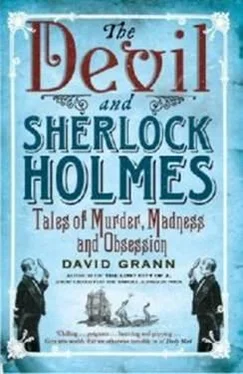“None of it happened,” Wroblewski later told me. “We used standard procedures and followed the letter of the law.”
According to Wroblewski and other officers, they apprehended Bala by the drugstore without violence and drove him to police headquarters in Wroclaw. Wroblewski and Bala sat facing each other in the detective’s cramped office; a light bulb overhead cast a faint glow, and Bala could see on the wall the goat horns that eerily resembled the image on the cover of his book. Bala appeared gentle and scholarly, yet Wroblewski recalled how, in “Amok,” Chris says, “It’s easier for people to imagine that Christ can turn urine into beer than that someone like me can send to Hell some asshole smashed into a lump of ground meat.”
Wroblewski initially circled around the subject of the murder, trying to elicit offhand information about Bala’s business and his relationships, and concealing what the police already knew about the crime-an interrogator’s chief advantage. When Wroblewski did confront him about the killing, Bala looked dumbfounded. “I didn’t know Dariusz Janiszewski,” he said. “I know nothing about the murder.”
Wroblewski pressed him about the curious details in “Amok.” Bala later told me, “It was insane. He treated the book as if it were my literal autobiography. He must have read the book a hundred times. He knew it by heart.” When Wroblewski mentioned several “facts” in the novel, such as the theft of the statue of St. Anthony, Bala acknowledged that he had drawn certain elements from his life. As Bala put it to me, “Sure, I’m guilty of that. Show me an author who doesn’t do that.”
Wroblewski then played his trump card: the cell phone. How did Bala get hold of it? Bala said that he couldn’t remember-it was five years ago. Then he said that he must have bought the phone at a pawnshop, as he had done several times in the past. He agreed to take a polygraph test.
Wroblewski helped to prepare the questions for the examiner, who asked:
Just before Dariusz Janiszewski lost his life, did you know this would happen?
Were you the one who killed him?
Do you know who actually murdered him?
Did you know Janiszewski?
Were you in the place where Janiszewski was held hostage?
Bala replied no to each question. Periodically, he seemed to slow his breathing, in the manner of a scuba diver. The examiner wondered if he was trying to manipulate the test. On some questions, the examiner suspected Bala of lying, but, overall, the results were inconclusive.
In Poland, after a suspect is detained for forty-eight hours, the prosecutor in the case is required to present his evidence before a judge and charge the suspect; otherwise, the police must release him. The case against Bala remained weak. All Wroblewski and the police had was the cell phone, which Bala could have obtained, as he claimed, from a pawnshop; the sketchy results of a polygraph, a notoriously unreliable test; a book on hanging that Bala might not even have purchased; and clues possibly embedded in a novel. Wroblewski had no motive or confession. As a result, the authorities charged Bala only with selling stolen property-Janiszewski’s phone-and with paying a bribe in an unrelated business matter, which Wroblewski had uncovered during the course of his investigation. Wroblewski knew that neither charge would likely carry any jail time, and although Bala had to remain in the country and relinquish his passport, he was otherwise a free man. “I had spent two years trying to build a case, and I was watching it all collapse,” Wroblewski recalled.
Later, as he was flipping through Bala’s passport, Wroblewski noticed stamps from Japan, South Korea, and the United States. He remembered that the Web site of the television show “997” had recorded page views from all of those countries-a fact that had baffled investigators. Why would anyone so far away be interested in a local Polish murder? Wroblewski compared the periods when Bala was in each country with the timing of the page views. The dates matched.
Bala, meanwhile, was becoming a cause célèbre. As Wroblewski continued to investigate him for murder, Bala filed a formal grievance with the authorities, claiming that he had been kidnapped and tortured. When Bala told his friend Rasinski that he was being persecuted for his art, Rasinski was incredulous. “I figured that he was testing out some crazy idea for his next novel,” he recalls. Soon after, Wroblewski questioned Rasinski about his friend. “That’s when I realized that Krystian was telling the truth,” Rasinski says.
Rasinski was shocked when Wroblewski began to grill him about “Amok.” “I told him that I recognized some details from real life, but that, to me, the book was a work of fiction,” Rasinski says. “This was crazy. You cannot prosecute a man based on the novel he wrote.” Beata Sierocka, Bala’s former professor, who was also called in for questioning, says that she felt as if she were being interrogated by “literary theorists.”
As outrage over the investigation mounted, one of Bala’s girlfriends, Denise Rinehart, set up a defense committee on his behalf. Rinehart, an American theatre director, met Bala while she was studying in Poland, in 2001, and they had subsequently travelled together to the United States and South Korea. Rinehart solicited support over the Internet, writing, “Krystian is the author of a fictional philosophical book called ‘Amok.’ A lot of the language and content is strong and there are several metaphors that might be considered against the Catholic Church and Polish tradition. During his brutal interrogation they referenced his book numerous times, citing it as proof of his guilt.”
Dubbing the case the Sprawa Absurd-the Absurd Matter-the committee contacted human-rights organizations and International PEN. Before long, the Polish Justice Ministry was deluged with letters on Bala’s behalf from around the world. One said, “Mr. Bala deserves his rights in accordance with Article 19 of the U.N. Declaration of Human Rights that guarantees the right to freedom of expression… We urge you to insure there is an immediate and thorough investigation into his kidnapping and imprisonment and that all of those found responsible are brought to justice.”
Bala, writing in imperfect English, sent out frantic bulletins to the defense committee, which published them in a newsletter. In a bulletin on September 13, 2005, Bala warned that he was being “spied” on and said, “I want you to know that I will fight until the end.” The next day, he said of Wroblewski and the police, “They have ruined my family life. We will never talk loud at home again. We will never use internet freely again. We will never make any phone calls not thinking about who is listening. My mother takes some pills to stay calm. Otherwise she would get insane, because of this absurd accusation. My old father smokes 50 cigs a day and I smoke three packs. We all sleep 3-4 hours daily and we are afraid of leaving a house. Every single bark of our little dog alerts us and we don’t know what or who to expect. It’s a terror! Quiet Terror!”
The Polish authorities, meanwhile, had launched an internal investigation into Bala’s allegations of mistreatment. In early 2006, after months of probing, the investigators declared that they had found no corroborating evidence. In this instance, they insisted, Bala’s tale was indeed a mytho-creation.
“I have infected you,” Chris warns the reader at the beginning of “Amok.” “You will not be able to get free of me.” Wroblewski remained haunted by one riddle in the novel, which, he believed, was crucial to solving the case. A character asks Chris, “Who was the one-eyed man among the blind?” The phrase derives from Erasmus (1469-1536), the Dutch theologian and classical scholar, who said, “In the kingdom of the blind, the one-eyed man is king.” Who in “Amok,” Wroblewski wondered, was the one-eyed man? And who were the blind men? In the novel’s last line, Chris suddenly claims that he has solved the riddle, explaining, “This was the one killed by blind jealousy.” But the sentence, with its strange lack of context, made little sense.
Читать дальше











